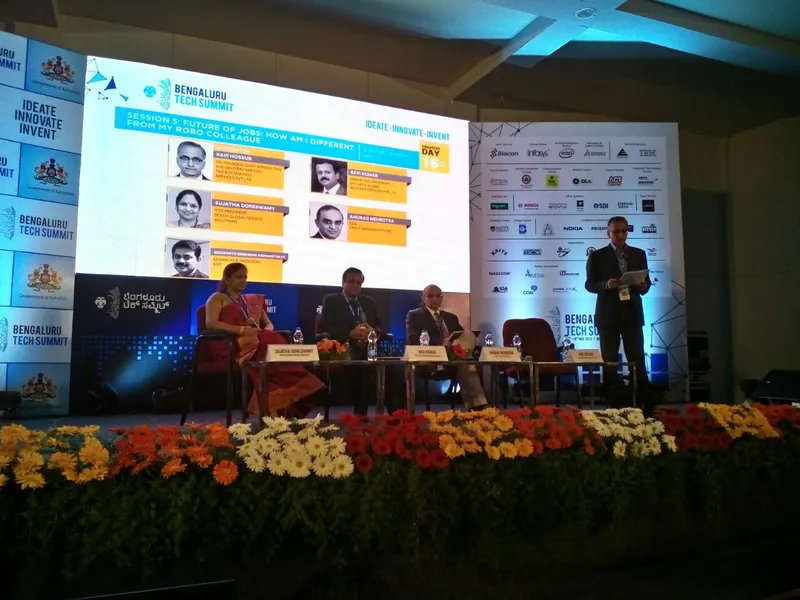In the era of AI, what is the future of jobs? Experts deliberate at Bengaluru Tech Summit
With India churning out 7.5 million graduates every year with practically no employable skills, a vast majority of them struggle to reskill themselves.
Doing something of their own is the only option they have in an era of Artificial Intelligence (AI). They also have to realise that there won't be ready jobs available to a vast majority of people. The question is what is the future of jobs?
For that, we need to segment off a part of the population and understand that a vast majority of India is not English speaking. For these people, jobs do not seem to be the first choice because they have an advantage -- as they speak English -- over a non-English speaking population that has not been educated at reputed schools and colleges.

This was the topic of discussion on the first day of the Bengaluru Tech Summit today.
Graduates from top colleges like the IITs, IIMs, BITs-Pilani, and other top 50 B-schools in the country have been at the forefront of a thriving startup culture in the country and get great corporate jobs too.
However, today regardless of the language or skill, robotics is being used in all processes and AI is making applications intelligent without having people to manage them. Automation is not new and has been around forever.
But a lot has changed in automation -- in 20 years - itself because automation needed people to manage software earlier and now the machine writes its own algorithms to make decisions after being trained to read patterns. “In Industry 4.0, human processes in the backend are being replaced by AI and this is the change that we have to manage,” says Ravi Hossur, Founder of Tao Automation Services.
Sujata Doreswamy, VP Bosch Global Service Solutions, says, “In 2016, Bosch started automating everything. We launched the proof of concept and realised that 25 percent of process cycle time would reduce thanks to robotics. This is why we decided to go big bang in the procurement services area and are now implementing in accounting and HCM applications. The bots are yielding a lot of results.”
So what should be done?
Change management was critical when Bosch did this. “We addressed people, process, and systems in the entire cycle of change. People should be made inclusive in the RPA journey because people have to be upskilled,” says Sujatha. She adds that this should be done transparently and we have to be in the same loop.
The question is, should people focus on higher value work and reskilling.
Ravi Kumar, NTT Data Global Delivery Services, says, “A client wanted 85 percent cost reduction and we did that for them through AI and robotics. So the jobs have to be inclined to the future such as data analytics and managing the knowledge being programmed to the bot.”
Anurag Mehrotra, CMS IT Services Pvt Ltd, says jobs are going. “In the next eight quarters there will be a 90 percent reduction in support function and it is purely because technology and its pieces can predict outcomes better than humans. We are experiencing this as part of a continuum where complete automation is the key driver.
Clearly, the panel says that the future is where you must be a manager to a certain extent, not a competition with a bot.
A PwC report on ‘The Future of Work: A Journey Towards 2022’ predicts that a student protest will erupt globally in 2020 as a consequence of the non-availability of jobs. This prognosis is based on universities not being able to keep pace with sudden changes in economy and technology such as automation.
In the same report, PwC has identified three scenarios or worlds for the future of work and categorised them as blue, green, and orange. In the blue world, big company capitalism will reign supreme with their focus on profit, growth, and market leadership. It will guarantee job security and long-service term for its employees in return for loyalty and flexibility.
The future of jobs need a roadmap and the Karnataka government is doing the right thing by setting up Centres of Excellence in AI, Data Sciences, and Cybersecurity. Karnataka wants to reskill as many engineers by 2022 and the right away forward is to join a corporate that can retrain you rather than retrench you.







